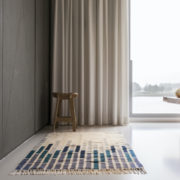Een stijlvol en zomers handgeweven vloerkleed. Exclusief voor de NRC webwinkel liet Fair Fabrics, in samenwerking met een van haar Tunesische vakatelier en de Nederlandse ontwerper Willemiek van Kuijlenborg, een wollen vloerkleed maken en produceren in een beperkte oplage.

Foto: Geert van Hertum
Net als voor veel andere ondernemers was de afgelopen periode niet eenvoudig. De ateliers in Marokko en Tunesië waren gesloten, de ambachtslieden hadden geen inkomen, de toekomst was – en is nog steeds – zeer onzeker en de transporten naar Nederland zijn pas eindelijk (maar moeizaam) aan de gang. Gelukkig is dit project nu op een goed punt gekomen: de kleine coöperatie in Tunesië heeft geen gemeenschappelijke werkplaats, maar hierdoor konden ze de afgelopen maanden allemaal thuis werken en een inkomen verdienen. Dit maakt logistiek ingewikkelder, maar dit was ook hun overlevingsmechanisme.
Het kleine vakatelier in het noorden van Tunesië wordt geleid door Sihem. Ze leerde de kunst van het weven van tapijten van haar moeder. Ze heeft de vaardigheid doorgegeven aan haar twee dochters, Sarah en Nour, die haar helpen met ontwerpen voor moderne versies van traditionele tapijten. Sihem is erin geslaagd een nieuw leven te blazen in een ambacht dat bijna uit haar dorp was verdwenen. Ze werkt met vier of vijf andere vrouwen die tapijten weven en distribueert deze via lokale beurzen en een netwerk van ambachtslieden.

Foto: Family Sihem
Haar beide dochters houden niet van het weefraam. ‘We zijn niet geduldig genoeg om het te leren, want het is erg moeilijk. Alles moet perfect zijn, zonder gebreken. In feite creëren we alleen nieuwe ontwerpen, ideeën en kleuren, maar als het om het weven zelf gaat, raken we verdwaald.”
‘Opgroeien met een moeder als de mijne heeft me beïnvloed.
We zien de wereld anders,
maar de gebruiken en de tradities die we geleerd hebben, blijven hetzelfde. “
Ook de moeder van Sihem staat altijd klaar om hen te helpen. Ze is meer ervaren en helpt de wol schoon te maken. De vrouwen waarmee Sihem werkt, werken ook op het land en tijdens de olijvenoogst komen ze niet toe aan het weefwerk. Ze kunnen niet alleen afhankelijk zijn van weven omdat handwerk niet langer een winstgevende onderneming is.
‘Niet naar school gaan is waar ik het meeste spijt van heb in mijn leven.’
Sihem vond het jammer dat ze niet naar school ging, haar vader kon het niet betalen omdat ze thuis met zeven kinderen waren. Daarom moedigt ze haar kinderen aan om te blijven studeren en te bereiken wat zij niet kon. De mensen in haar dorp werken heel hard, vrouwen werken evenveel als mannen. Vrouwen die daar wonen zijn echte strijders, ze helpen hun man met alles wat ze doen. “Dit is waar ik thuis hoor. Het is mijn oorsprong en het land van mijn voorouders. ”

Foto: Moncef Ben Rajeb
Mijn moeder produceert op traditionele wijze wol en ze leert ons hoe we de draden kunnen scheiden en het weefgetouw kunnen bevestigen. Ze leert alle vaardigheden van haar moeder. Als klein meisje zag ze haar weven. Ze pakte het steekspoel vast en hield hem vast als een pen.
Haar moeder heeft haar moeder geleerd hoe ze het moet doen. Lang geleden draaiden vrouwen het garen. Als ze naar buiten ging, sloop ze naar binnen en draaide wat wol. Soms deed ze haar vinger pijn, dus rende ze naar haar kamer en verstopte zich voor haar moeder.
Je kunt voelen dat sommige tapijten een ziel hebben, maar als iemand het niet met liefde en passie maakt, zal het niet aantrekkelijk zijn. “Ik denk dat passie nodig is om goed werk te produceren. Zelfs als het om te verkopen is, moet het met passie worden gemaakt.”

Foto: Geert van Hertum
Delen van dit interview komen uit de documentaire “The Thread”. Een film van Brian Tilley.








